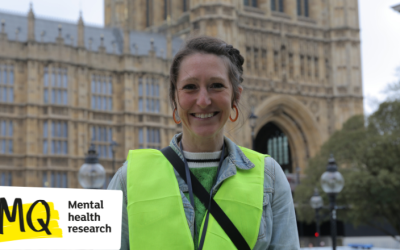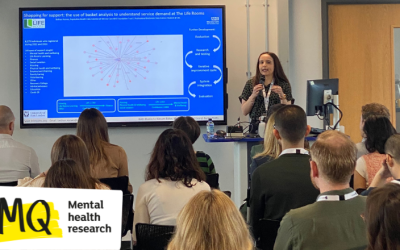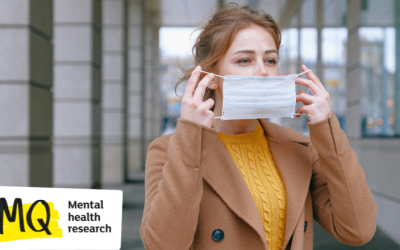Mental health research service user and carer involvement 2022 award winners announced
The achievements of mental health research teams who actively seek to involve carers and service users in clinical research have been recognised at a high profile awards event.
The National Institute for Health and Care Clinical Research Network (NIHR CRN), The McPin Foundation and MQ: Mental Health Research work together to run the prestigious annual Mental health research service user and carer involvement awards. These awards celebrate the work of those dedicated researchers and service users who go above and beyond to design research and involve participants to improve care.
The overall winner of the 2022 award was “Narrative Experiences Online” (NEON) - a research study led by the Institute of Mental Health at the University of Nottingham. The study looks at whether reading or listening to other people’s online stories of personal recovery can improve quality of life for people with psychosis.
The runner-up for the award was the Enhancing Child and Adolescent Mental Health Service Referrals (EnCAMHS).
The awards ceremony was hosted by Deutsche Bank as part of their Charity of The Year partnership with MQ.
 The winning study team: NEON
The winning study team: NEON
The NEON programme evaluates whether having online access to people’s real-life stories of recovery from mental health problems can be helpful for people affected by mental health problems. The different NEON studies are aimed at: those with psychosis related mental health problems, those with non-psychosis related mental health problems and people who self-identify as informal carers for those affected by mental health problems.
The judging panel were particularly impressed by how the NEON study team had truly permeated service user and carer involvement into every phase of the study, from inception to dissemination and their inclusive recruitment process.
The NEON team have been able to interweave user and carer involvement into every stage of their studies through their Lived Experience Advisory Panel (LEAP), who have been integrated into all relevant study activities.
An innovative aspect is that the job description for all NEON research and administrative roles include lived experience of mental health problems as either desirable or essential, and all interview panels to recruit staff include a LEAP member.
The LEAP members were instrumental in outlining how the NEON studies could recruit inclusively suggesting that the NEON collection should include a minimum number of people with protected characteristics to avoid harm through under-representation.
Through the participation of people with lived experience, two NEON studies recruited to time and target. LEAP members consistently refined recruitment materials, producing a splash page that addressed all the queries of potential participants. LEAP members also acted as paid community champions, encouraging participation from people who would not usually taking part in clinical trials.
LEAP have heavily influenced how the study findings have been disseminated to an academic and public audience. Their members co-authored 13 academic papers out of the 22 papers published by the NEON programme and have written blogs summarising the academic papers and discussing lived experience.
Contemplating the award, Professor Mike Slade, Chief Investigator of NEON and Professor of Mental Health Recovery and Social Inclusion, University of Nottingham said:
“I am delighted that our collective efforts to ensure mental health lived experience informs all aspects of the NEON Study have been recognised”.
 The runner-up study team: EN-CAMHS
The runner-up study team: EN-CAMHS
The EN-CAMHS study addresses the long waiting times to access mental health services and the current lack of other appropriate support for children and young people (CYP).
The judging panel commended the EN-CAMHS study team for how they successfully involved CYP, parents and others throughout the study process.
The EN-CAMHS study service users and carers have been consistently involved in decisions. During the proposal stage EN-CAMHS collaborated with PLACE, the largest parent/carers support network, to ensure the outcomes of the study were aligned with the service users’ and carers’ requirements. For example, reducing waiting times and being informed on the progress of a referral once it was submitted became key focuses of the study.
In the setup phase, the EN-CAMHS study team consistently referred to their Young Persons’ Advisory Group (YPAG) and Parents’ and Professionals’ Advisory Group (PPAG), ensuring the needs and experiences of service users were reflected. Presentations and questions to CYP focus groups were adapted to enhance comprehensiveness and understanding amongst participants. The type of questions posed to the focus group were also changed, including issues that PPAG and YPAG felt were more pertinent such as inappropriate referrals.
Service users also informed how recruitment should take place, which was crucial in ensuring the EN-CAMHS study hit the recruitment target. Suggestions included communicating the study on Instagram, rather than Twitter, and engaging sixth form colleges to promote the study.
Service users and carers were vital to the EN-CAMHS study dissemination strategy, which has been extensive to ensure all collaborators to the study feel that their contributions have been heard. The study results were cascaded through a young person-led podcast series, a co-developed blog post series and co-presentation at service user and carer conferences.
Reflecting on the award, research associate, Heidi Tranter said:
“The EN-CAMHS research team and I feel extremely thankful to receive runner-up for this award, as the priorities and views of service users and parents/carers have been at the heart of this project from the start”
You can read more about the EN-CAMHS project here.
“Recognising the importance of involving the very people who are most-impacted by the outcomes of studies is a key part of MQ’s approach to research. This is why we are so delighted by the incredibly high calibre of applicants for this year’s NIHR, McPin and MQ Research Awards.
Designing research, with meaningful involvement of service users and experts by experience in study design, implementation and dissemination is so important if we are to really create a positive effect on people’s lives.
The winning study, NEON, impressed us all with their active involvement of carers and service users in all phases of the study. Congratulations to them and the runners up EN-CAMHS.” - Lea Milligan, CEO of MQ: Mental Health Research
Dr Thomas Kabir, head of public involvement for the McPin Foundation, said:
“The McPin Foundation congratulates the NEON and EN-CAMHS studies on winning this year’s awards. The pandemic has brought challenges for all of us. These studies have successfully navigated these challenges and maintained excellent service user and carer involvement throughout.
Both studies are real examples of how innovative user and carer involvement makes research better. We look forward to the findings from both studies becoming available, and making a real difference to people with mental health issues everywhere.”
Phil Evans, Deputy Medical Director, of the NIHR CRN said:
"As we emerge from the pandemic the mental health of us all has never been more important. The NIHR Clinical Research Network (NIHR CRN) is delighted to recognise the innovation and demonstrable benefit of effective engagement with people with lived experience, service users and carers in the winning application (NEON) and the runner-up (EN-CAMHS).They have both capably demonstrated how effectively incorporating service user and carer experience can shape a research study and add immeasurably to the research that is being undertaken. Many congratulations to them both."


